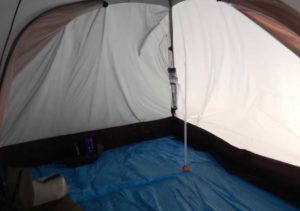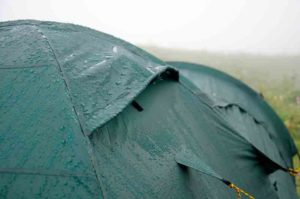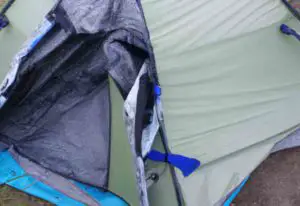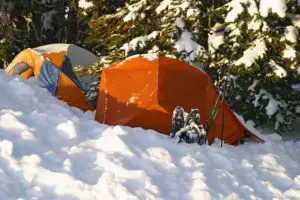When you’re out hunting, the last thing you want is to be cramped up in a small tent. A good hunting tent will give you plenty of space to move around and store your gear. In this blog post, we will discuss the different factors you need to consider when choosing a hunting tent. We’ll also provide some tips for finding the best deal on a quality tent. So read on to learn more!
Wall Tents VS Canvas Tent
When it comes to hunting tents, there are two main types: wall tents and canvas tents. Wall tents are typically more expensive but offer more space and better durability. Canvas tents are less expensive but may not hold up as well in bad weather. Here are some things to keep in mind when deciding between a wall tent and a canvas tent:
Size and Weight
The first thing you need to consider is the size and weight of the tent. If you plan on hunting in remote areas, you will want a light tent that is easy to carry. However, if you don’t mind carrying a little extra weight, a larger tent will give you more space to move around and store your gear.
Price
Of course, price is always a factor when choosing any type of gear. Hunting tents can range in price from around $100 to over $1000. It’s important to find a balance between quality and price. Don’t be afraid to spend a little extra on a quality tent that will last for years.
Durability
When you’re out in the wilderness, you need a tent that can withstand all kinds of weather conditions. Make sure to check the tent’s waterproof rating and wind resistance before making your purchase.
Weather Conditions
You also need to consider the weather conditions in the area where you plan on hunting. If you’re going to be camping in a cold climate, make sure to choose a tent that has good insulation. For hot climates, look for a tent with ventilation to help keep you cool.
Disadvantages of canvas wall tents
- The disadvantage of canvas wall tents is that they are expensive.
- The advantage of canvas wall tents is that they offer more space and better durability.
- The disadvantage of canvas tents is that they may not hold up as well in bad weather.
What is the best type of winter hunting tent?
The best type of winter hunting tent depends on your needs. If you plan on hunting in remote areas, you will want a light tent that is easy to carry. However, if you don’t mind carrying a little extra weight, a larger tent will give you more space to move around and store your gear.
What are the different types of hunting tents?
The two main types of hunting tents are wall tents and canvas tents. Wall tents are typically more expensive but offer more space and better durability. Canvas tents are less expensive but may not hold up as well in bad weather.
What’s the name of this winter shelter?
What are the canvas tents called?
The term “canvas tent” typically refers to a camping tent made from waterproofed canvas fabric. Canvas is a durable and sturdy material that has been used for tentmaking for centuries. Modern canvas tents are available in a variety of sizes and styles and can be equipped with features like sewn-in floors, rain flaps, and mosquito nets.
What is the most heat-resistant tent?
The most heat-resistant tent is the Black Diamond Goblin Tent. It is made with a combination of 50D and 70D ripstop nylon fabrics and has a heat-reflective coating on the flysheet.
What kind of tent is appropriate for the winter?
It depends on what you’re using the tent for. If you’re camping in cold weather, you’ll need a winter camping tent that is designed to keep you warm and dry in extreme conditions. If you’re using the tent for winter sports or activities, like skiing or snowboarding, you’ll need a different type of tent that is designed to withstand wind and snow.
No matter what your needs are, it’s important to choose a quality tent made from durable materials that will protect you from the elements. And always practice proper safety precautions when camping or participating in winter sports. Stay safe and have fun!
Is a four-season tent worth it?
It depends on what you mean by “worth it.” A four-season tent is more expensive than a three-season tent, and it will be heavier. However, a four-season tent will keep you warmer in colder weather and cooler in hotter weather. It will also be more waterproof and windproof. So if you plan to use your camping tent in all types of weather, then a four-season tent is definitely worth the investment.
How much does a four-season tent cost?
A four-season tent will typically run you somewhere between $200 and $300. However, keep in mind that this is just an average price range. You can certainly find four-season tents that cost more or less than this.
When determining how much you want to spend on a four-season tent, it is important to consider what you will be using the tent for. If you only plan on using the tent for short camping trips in mild weather conditions, then you may not need to invest in a high-end, expensive model. On the other hand, if you want a four-season tent that can withstand harsher conditions and be used for longer trips, then you may need to spend a bit more money.
Is it possible to use a 3-season tent in the winter?
Yes, it is possible to use a 3-season tent in the winter, but there are a few things to keep in mind.
First, you’ll want to make sure that your tent is properly anchored and has enough weight inside of it to withstand wind and snow.
Second, you’ll need to insulate your tent. This can be done with thick blankets or by using an inflatable sleep pad.
Third, you’ll want to make sure that you have a good quality sleeping bag that is rated for cold weather. Fourth, you should bring along some hand warmers or foot warmers to help keep yourself comfortable during the night. Finally, it’s always a good idea to pack extra food and water in case of an emergency.
How can you insulate your camping tent for the winter?
A lot of people use foam insulation or even reflectix. You could also use a space blanket, but that might not be as effective.
If you’re using foam insulation, you’ll want to make sure that it’s approved for exposure to moisture. Otherwise, the insulation will become saturated and ineffective. You can attach the insulation with some kind of tape or adhesive, or you can leave it in place and put your tent over the top of it.
Reflectix is a good option if you don’t want to deal with insulation foam. It’s a reflective material that will help keep your tent warm. You can either lay it on the ground beneath your tent or attach it to the outside of your tent. If you choose to attach it to the outside of your tent, make sure that you do so securely so that it doesn’t blow away in the wind.
What is the ideal method to heat a tent?
The best way to heat a tent will depend on the size and type of tent that you have, as well as the temperature outside.
If you have a small tent, you can use a camp stove or portable heater to keep yourself warm. Make sure to crack open a window or vent in the tent to avoid suffocation. If it’s cold outside, bring a sleeping bag or bedroll inside the tent so you don’t freeze during the night.
For larger tents, you may want to consider investing in a propane-powered heater. These heaters will evenly distribute warmth throughout the entire space, making everyone more comfortable. Just be sure to use the heater safely and follow all manufacturer instructions.
Another option for heating a tent is to build a fire outside of it. You can then use a reflector to direct the heat into the tent. This method is best used in emergencies, as it can be dangerous if not done properly.
What are fire-treated tents?
A fire-treated tent is a tent that has been treated with a flame retardant chemical. This treatment helps to prevent the spread of fire and can be beneficial in emergencies.
When choosing a fire-treated tent, it is important to make sure that the treatment is effective against both flames and heat. Some treatments are only effective against one or the other. It is also important to make sure that the treatment does not reduce the overall strength or durability of the tent fabric.
Fire-treated tents are available in a variety of materials, including nylon and polyester. The type of material that you choose should be based on your needs and preferences.








